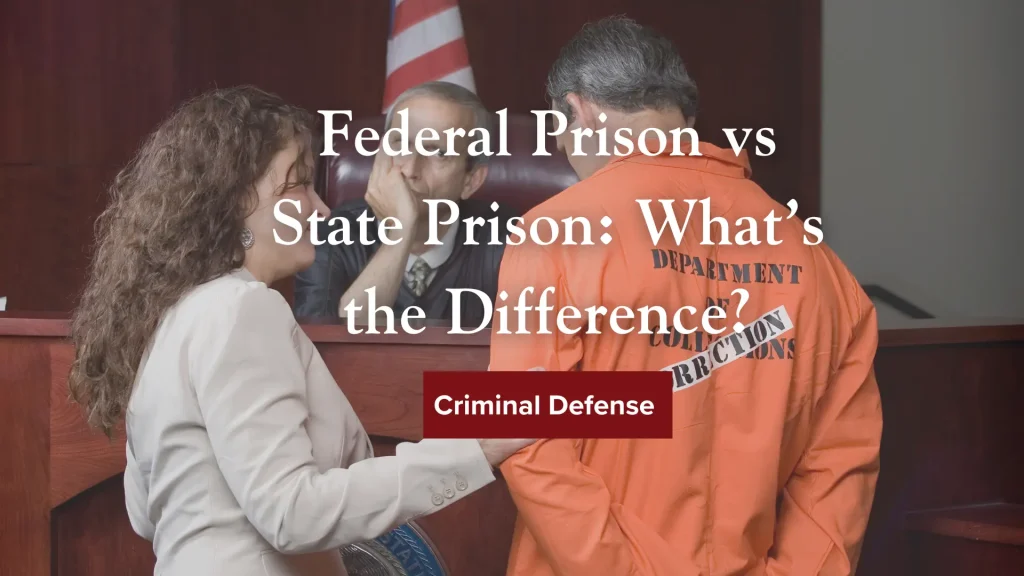
What is the difference between state vs federal prisons? Criminal defendants charged with or convicted of a crime in Wisconsin face daunting hurdles and must work through a complicated criminal justice system. Criminal charges can be brought under state or federal laws. Those convicted of federal crimes serve time in federal prisons, while state crimes go through the state prison system.
According to the Bureau of Federal Prisons, there are over 158,000 incarcerated people in all federal prisons in the country. The Wisconsin Department of Corrections states that there are approximately 22,000 incarcerated people in Wisconsin’s state prisons.
In Wisconsin, it’s important for someone who has been arrested for or charged with a crime to learn whether their charges are based on state or federal laws. That distinction determines the kind of prison where authorities might incarcerate them. The experienced Milwaukee criminal defense attorneys at Hart Powell, S.C. can explain the distinctions between state vs federal prison.
How Many Prisons Are in Wisconsin?
FCI Oxford Camp is a minimum-security federal prison also located in Oxford. It also predominantly houses male inmates.
Wisconsin has twenty state prisons.
What Is the Difference Between Federal and State Prisons?
The federal government runs federal prisons, while individual state governments run their own state-level prisons. Because federal crimes are often non-violent, federal prisons are safer than state prisons. They also have fewer inmates than state prisons.
Federal vs. State Crimes
Federal crimes may include drug trafficking across state lines, mail fraud, tax evasion, and crimes involving multiple states or national borders. These are mostly white-collar crimes. Crimes such as drug trafficking, racketeering, or firearms offenses may carry life sentences.
State crimes include burglary, assault, murder, and drug possession. State crimes can be much more violent than most federal crimes, and the penalties can range from eighteen months in prison to life imprisonment.
Levels of Security
- Minimum security
- Low security
- Medium security
- High security
- Administrative security
In 2024, the average federal sentence is at about 149 months.
State prisons come in three levels:
- Minimum security
- Medium security
- Maximum security
Safety
Federal prisons are generally safer than state prisons because most federal crimes are non-violent. Additionally, lower prison populations and more security options to divide prisoners appropriately further improve the safety factor.
State prisons, on the other hand, are home to many violent offenders with long incarceration periods. Since state prisons only have three levels of security, they incarcerate many violent offenders together, making maximum security prisons dangerous places for inmates.
Taxpayer money pays for both systems. Both types of prisons have separate arrangements for women and men, and both systems have prisons rated for different levels of security. Both types of prisons aim to rehabilitate their inmates.
What Determines If You Go to State or Federal Prison?

Federal courts prosecute federal crimes, and the offender goes to federal prison. Conversely, state courts prosecute violations of state laws, and convicted people serve in state prisons.
- Federal Case Example: A person accused of embezzling funds from a federally insured bank is tried in federal court and sentenced to a federal prison.
- State Case Example: A person accused of armed robbery in Wisconsin is prosecuted under state law and sentenced to a Wisconsin state prison.
Comparison of Inmate Services and Programs
Both federal and state prisons offer services and programs aimed at inmate rehabilitation, but there are differences in availability and quality.
Education and Vocational Training
Federal prisons often provide more extensive educational and vocational training programs than state prisons. Consequently, these programs help inmates acquire skills that will assist them in reentering society post-release.
State prisons may also offer educational and vocational programs; however, the quality can vary significantly from one state to another. Moreover, budget constraints and state policies influence these offerings.
Medical and Mental Health Services
Inmates in federal prisons have access to comprehensive medical and mental health services. The BOP must provide healthcare that meets community standards.
State prisons’ quality of health services can be inconsistent. Wisconsin has faced a staff shortage, which limits the access incarcerated people have to healthcare.
Recidivism Rates and Post-Release Support
Rates of recidivism—the tendency of a convicted felon to re-offend—measure how effective the prison is at rehabilitation. Federal and state prisons hope to reduce these rates through various programs and support systems.
- Federal Prisons – The BOP implements programs designed to lower recidivism rates. These programs include educational opportunities, vocational training, and drug treatment. Inmates may also participate in supervised release programs that help them transition back into society.
- State Prisons – State prisons also strive to reduce recidivism through similar programs. In Wisconsin, those programs include anger management, substance abuse, domestic violence, and sex offender treatment, as well as ESL, GED, and career and vocational education.
In addition to these programs, prisons may offer gender-specific programs that address housing, finding employment, child care, and mental health.
Which Is Harder: State Prison or Federal Prison?
There is no simple answer to this question. The difficulty of serving time depends on several factors, including the security level, the specific institution, and the individual’s circumstances and resiliency.
Contact an Attorney at Hart Powell, S.C. for More Information
Understanding the differences between federal vs state prisons is crucial for anyone who is facing criminal charges. The thought of facing incarceration is frightening, and the more information a person has before incarceration occurs, the more prepared they will be for the outcome of their case.
If you have been arrested for or charged with a crime in Wisconsin, the skilled criminal defense attorneys of Hart Powell, S.C. can help you. Contact us online or call us at (414) 271-9595 today so that we can start building the strongest possible defense for you. Our goal is to avoid or reduce any potential sentence and to protect your rights. Our team of attorneys can also get you the best compensation you deserve.
